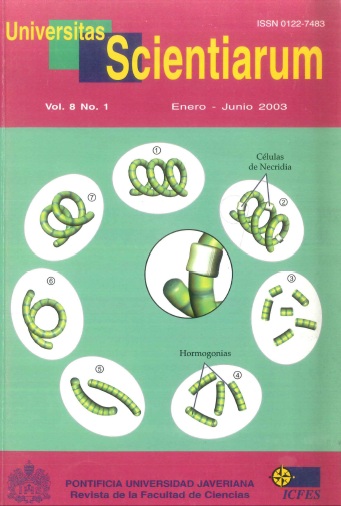Abstract
The study was conducted to assess food consumption and life styles in relation to cigarette smoking in students ofthe School of Sciences at Javeriana University in Bogotá. It was a cross sectional study which included 130subjects who were randornly selected from the total population of students ofthe School of Sciences. Chi-square analyses were used for categorical data, and t tests or Z scores analyses were used for continuous data. All testsresults were considered significant at p < 0.05. Comparisons were made between smokers and non- mokers.Cigarette smoking was not associated with sex, health farnily history or physical activity (P > 0.05). Overweight/fatness (p = 0.03) and alcohol consumption (p = 0.009) were associated with cigarette smoking. Smokers had ahigher consumption of energy (13%), total fat (3.8%), saturated fat (2.5%) and cholesterol (18.9%) than nonsmokers
(p < 0.05). The highest associations were between cigarette smoking and the low consumption of fruits(p = 2.53 x 10-6) and vegetables (p = 5.8 x 10-4). Less that 50% of smokers reported changes in food taste. In conclusion, smokers showed to be at higher risk to develop cardiovascular diseases ·as they presented more riskfactors, as well as higher consumption of energy, total and saturated fat and cholesterol and a low consumption offruits and vegetables
Univ. Sci. is registered under a Creative Commons Attribution 4.0 International Public License. Thus, this work may be reproduced, distributed, and publicly shared in digital format, as long as the names of the authors and Pontificia Universidad Javeriana are acknowledged. Others are allowed to quote, adapt, transform, auto-archive, republish, and create based on this material, for any purpose (even commercial ones), provided the authorship is duly acknowledged, a link to the original work is provided, and it is specified if changes have been made. Pontificia Universidad Javeriana does not hold the rights of published works and the authors are solely responsible for the contents of their works; they keep the moral, intellectual, privacy, and publicity rights. Approving the intervention of the work (review, copy-editing, translation, layout) and the following outreach, are granted through an use license and not through an assignment of rights. This means the journal and Pontificia Universidad Javeriana cannot be held responsible for any ethical malpractice by the authors. As a consequence of the protection granted by the use license, the journal is not required to publish recantations or modify information already published, unless the errata stems from the editorial management process. Publishing contents in this journal does not generate royalties for contributors.



